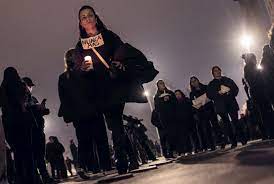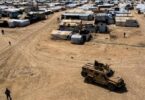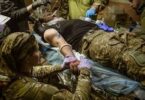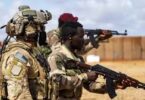SANTIAGO (Reuters): Chile marked 50 years since a violent coup by Augusto Pinochet against socialist President Salvador Allende ushered in two decades of military rule that saw thousands killed and seeded the country’s market-led economic model.
The coup on Sept. 11, 1973, in which tanks roamed the streets of Santiago and Hawker Hunter planes bombed a burning La Moneda presidential place, reverberated around the world.
It marked the start of a series of U.S.-friendly, right-wing dictatorships that governed much of South America well into the 1980s and were characterized by mass arrests, torture and disappearances.
A minute of silence at the official commemoration ceremony at La Moneda marked the exact moment the attack started.
“We commemorate a date that is painful and that, without a doubt, is a turning point in our history,” said President Gabriel Boric.
“The coup can’t be separated from what came after; from that moment human rights were violated.”
But with half a century gone by, Chile is sharply polarized. Victims of military rule and their families have ramped up a push for justice and accountability, but politically the far-right has gained ground amid growing fears over rising crime.
“Some people don’t know anything about what happened and aren’t interested, others are tired that … even after 50 years, many people still don’t know what happened to their disappeared relatives,” said Elvira Cadiz, who was 6 years old in 1973.
“And as long as that doesn’t change, it will continue to hurt and divide.”
She remembers neighbors being lined up in the streets and troops checking house by house in the working-class neighborhood of Estacion Central in the capital Santiago where she still lives.
While Boric campaigned for a big event to remember the coup anniversary, he has faced pushback from some politicians and voters. A recent Pulso Ciudadano survey showed 60% of Chileans were not interested, while almost four in ten people said they mostly blamed Allende’s government for the coup.
Allende’s administration, which lasted three years, attempted radical change that was sometimes chaotic, and some conservatives contrast that with the changes made under Pinochet, which they say began Chile on the path to its status as one of South America’s more stable, economically successful and safe countries.
Violent protests against inequality rocked Santiago in 2019, sparking off a movement to redraft the Pinochet-era constitution. But that was rejected by voters last year in a major blow to the country’s progressives.
A far-right leader, Jose Antonio Kast, an outspoken supporter of Pinochet, is now playing a central role in a second redraft attempt.
“Polarization is as rampant as it ever was since the return to democracy,” said Cristian Valdivieso, director at local consulting firm Criteria.
‘NO FUTURE WITHOUT MEMORY’
Boric, 37, not born until over a decade after the coup, led the ceremony on Monday at the presidential palace where Allende 50 years ago delivered a famous speech as his government crumbled. Shortly after, Allende took his own life.
“There are some who invite us to turn the page, to forget the past,” Boric, a professed admirer of Allende, said recently. “But there is no possible bright future without memory and truth.”
According to various Chilean human rights commissions, there are 40,175 victims of the dictatorship – classified as politically executed, disappeared, imprisoned or tortured. Thousands also fled into exile and over 1,000 are still missing.
Pinochet’s rule ended in 1990 after most Chileans voted for democracy in a referendum. Never convicted of a crime, he died in 2006. But many military officers and ex-members of his secret police were convicted of torture, kidnapping and assassination.
Gaby Rivera, president of a group that brings together relatives of the disappeared in Chile, saw her father Luis Rivera taken in November 1975. Over the years her family has been given several versions of his fate, including that his body was thrown into the sea.
“We live this date with pain, but also with hope, because today we see that there is a little light,” she told Reuters. “We don’t know if we will achieve complete justice, but what we do have to do is get to the truth, find out where they are.”
Hundreds of commemorative acts are planned on Monday and regional leaders including Colombia’s Gustavo Petro and Mexico’s Andres Manuel Lopez Obrador, attended the official commemoration in Santiago.
Chris Dodd, the U.S. special presidential adviser for the Americas and Rage Against the Machine guitarist Tom Morello were also in attendance.
“When we are missing a disappeared detainee, it’s an absence that tears us all apart,” Boric said. “The state made them disappear so the state must take responsibility to find out where they are.”
Some Chileans have excused or minimized the human rights violations, saying they were necessary to bring economic prosperity to the country, or even deny them altogether.
Carlos Gonzalez, who was detained and tortured in 1976, and later exiled, said it pained him to see people play down the day’s significance.
“We really feel this date affect us, it makes you want to throw stones at the TV when you see that people appear who deny what happened,” he said.
“It is good to talk about what happened. And, as a survivor, I feel it as a responsibility to talk about this because there are many people who did not survive.”







